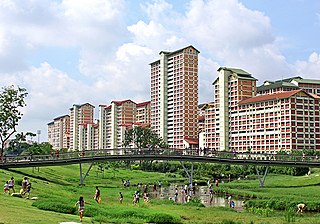
Public housing is a form of housing tenure in which the property is usually owned by a government authority, either central or local. Although the common goal of public housing is to provide affordable housing, the details, terminology, definitions of poverty, and other criteria for allocation vary within different contexts. Within the OECD, social housing represents an average of 7% of national housing stock (2020), ranging from ~34% in the Netherlands to less than 1% in Colombia.
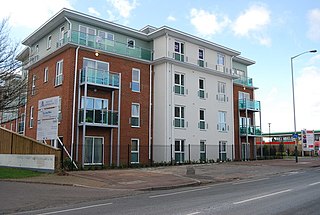
In Ireland and the United Kingdom, housing associations are private, non-profit making organisations that provide low-cost "social housing" for people in need of a home. Any budget surplus is used to maintain existing housing and to help finance new homes and it cannot be used for personal benefit of directors or shareholders. Although independent, they are regulated by the state and commonly receive public funding. They are now the United Kingdom's major providers of new housing for rent, while many also run shared ownership schemes to help those who cannot afford to buy a home outright.
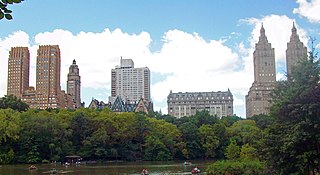
A housing cooperative, or housing co-op, is a legal entity, usually a cooperative or a corporation, which owns real estate, consisting of one or more residential buildings; it is one type of housing tenure. Typically housing cooperatives are owned by shareholders but in some cases they can be owned by a non-profit organization. They are a distinctive form of home ownership that have many characteristics that differ from other residential arrangements such as single family home ownership, condominiums and renting.
A tenant management organisations (TMO) is an organisation set up under the UK Government's Housing Regulations 1994, which allow residents of council housing or housing association homes in the UK to take over responsibility for the running of their homes.

Grant Shapps is a former British politician who served as Secretary of State for Defence from August 2023 to July 2024. Shapps previously served in various cabinet posts, including Conservative Party Co-Chairman, Transport Secretary, Home Secretary, Business Secretary, and Energy Secretary under Prime Ministers David Cameron, Boris Johnson, Liz Truss and Rishi Sunak. A member of the Conservative Party, he served as the Member of Parliament (MP) for Welwyn Hatfield from 2005 to 2024. He failed to be re-elected as his constituency's MP in the 2024 general election.
The Right to Buy scheme is a policy in the United Kingdom, with the exception of Scotland since 1 August 2016 and Wales from 26 January 2019, which gives secure tenants of councils and some housing associations the legal right to buy, at a large discount, the council house they are living in. There is also a Right to Acquire for assured tenants of housing association dwellings built with public subsidy after 1997, at a smaller discount. By 1997, over 1,700,000 dwellings in the UK had been sold under the scheme since its introduction in 1980, with the scheme being cited as one of the major factors in the drastic reduction in the amount of social housing in the UK, which has fallen from nearly 6.5 million units in 1979 to roughly 2 million units in 2017, while also being credited as the main driver of the 15% rise in home ownership, which rose from 55% of householders in 1979 to a peak of 71% in 2003; this figure has declined in England since the late 2000s to 63% in 2017.
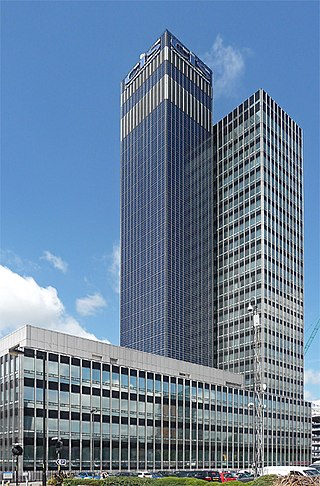
The CIS Tower is a high-rise office building on Miller Street in Manchester, England. Designed for the Co-operative Insurance Society (CIS) by architects Gordon Tait and G. S. Hay, the building was completed in 1962 and rises to 118 m (387 ft) in height. As of February 2024, the Grade II listed building is Greater Manchester's 12th-tallest building and the tallest office building in the United Kingdom outside London. The tower remained as built for over 40 years, until maintenance issues on the service tower required an extensive renovation, which included covering its façade in solar panels.
Housing Benefit is a means-tested social security benefit in the United Kingdom that is intended to help meet housing costs for rented accommodation. It is the second biggest item in the Department for Work and Pensions' budget after the state pension, totalling £23.8 billion in 2013–14.

The Mitchell–Lama Housing Program is a non-subsidy governmental housing guarantee in the state of New York. It was sponsored by New York State Senator MacNeil Mitchell and Assemblyman Alfred A. Lama. It was signed into law in 1955 as The Limited-Profit Housing Companies Act.

The Clays Lane Estate was a housing estate in Stratford, east London, and the UK’s largest purpose built housing cooperative. It was an experiment in building close-knit communities as a way of helping vulnerable single people. It became the subject of significant controversy when it was demolished to make way for the site of the London 2012 Olympic games.
The Tenant Services Authority (TSA) was the operating name of the Office for Tenants and Social Landlords, the former regulatory agency of registered providers of social housing in England.

Wikimedia UK (WMUK), also known as Wikimedia United Kingdom, is a registered charity established to support volunteers in the United Kingdom who work on Wikimedia projects such as Wikipedia. As such, it is a Wikimedia chapter approved by the Wikimedia Foundation (WMF), which owns and hosts those projects.

Homes England is the non-departmental public body that funds new affordable housing in England. It was founded on 1 January 2018 to replace the Homes and Communities Agency (HCA). HCA in turn was established by the Housing and Regeneration Act 2008 as one of the successor bodies to the Housing Corporation, and became operational on 1 December 2008.

Empty dwelling management orders (EDMOs) are a legal device used in England and Wales, which enable local authorities to put an unoccupied property back into use as housing. EDMOs were created by the Housing Act 2004, with the relevant legislation coming into effect in mid-2006; in the three and a half years to the end of 2010, however, only 43 had been issued.
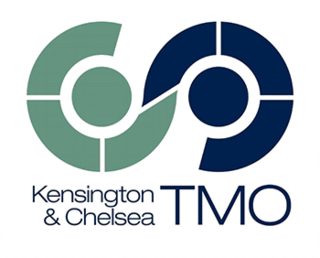
Kensington and Chelsea TMO (KCTMO) was the largest tenant management organisation (TMO) in England, managing nearly 10,000 properties on behalf of Kensington and Chelsea London Borough Council – the entire council housing stock in the Royal Borough of Kensington and Chelsea.
One Housing Group is a housing association based in London and the south east of the United Kingdom. They manage 16,000 homes and provide support to residents who needs special help, through their social care arm, One Support. As of 2015-16, they had an annual turnover of £255m and employed ~1800 staff.

Public housing in the United Kingdom, also known as council housing or social housing, provided the majority of rented accommodation until 2011, when the number of households in private rental housing surpassed the number in social housing. Dwellings built for public or social housing use are built by or for local authorities and known as council houses. Since the 1980s non-profit housing associations became more important and subsequently the term "social housing" became widely used, as technically council housing only refers to housing owned by a local authority, though the terms are largely used interchangeably.

Housing in the United Kingdom represents the largest non-financial asset class in the UK; its overall net value passed the £5 trillion mark in 2014. Housing includes modern and traditional styles. About 30% of homes are owned outright by their occupants, and a further 40% are owner-occupied on a mortgage. About 18% are social housing of some kind, and the remaining 12% are privately rented.

The Anti-Social Behaviour, Crime and Policing Act 2014 is an Act of the Parliament of the United Kingdom which consolidated and expanded law enforcement powers in addressing anti-social behaviour. One significant aspect of the act is that it replaced anti-social behaviour orders, the primary civil order in the United Kingdom since 1998, with criminal behaviour orders.
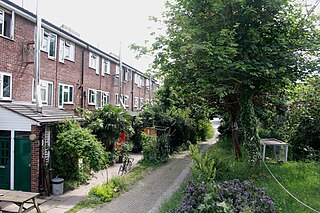
Sanford Housing Co-operative or Sanford Co-op is a housing co-operative located in south east London. Currently home to around 120 people, it is the first purpose-built housing co-operative in the United Kingdom and has run without interruption since its opening in 1974.














